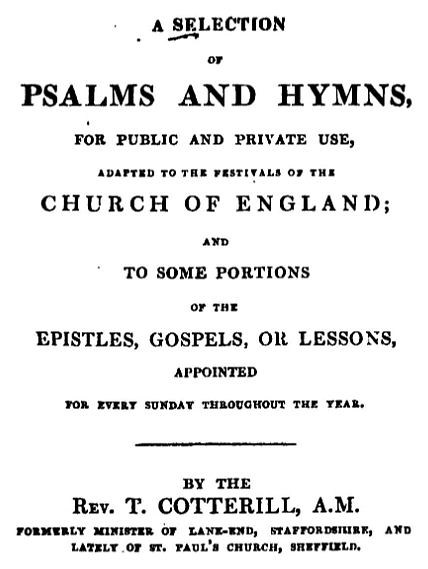Christmas Song #6: Broken Chains
Angels from the Realms of Glory links Old Testament promises with New Testament fulfillment, and even looks to the future.

This kind of explicit singing about Christ in the New Testament wasn’t very common when this carol was written. In fact, the singing of songs that were not Psalms was a matter of great controversy.
James Montgomery crossed paths with another songwriter who believed that both Psalms and newer hymns should be sung as a part of public worship, often making use of the New Testament revelation of Christ. Also in Sheffield for part of his life, the other man was Thomas Cotterill (quite possibly a relation of mine, but the specific connection is unknown. The general area of England is certainly right, but there were many Cottrills with all the variant spellings.)
Cotterill published some of Montgomery’s songs, and was editor of Selection of Psalms and Hymns, adapted to the Festivals of the Church of England. The songbook went through several editions, again, often amid great opposition. But in the end, this hymnbook would have a great influence on the many hymnbooks that were to come in the English-speaking world.
But back to our carol, which does blend the OT and the NT. The next verse is a bit ambiguous in the context of the carol, though very scriptural:
Saints, before the altar bending,
Watching long in hope and fear;
Suddenly the Lord, descending,
In His temple shall appear.
This verse seems to point to the future – or does it? The picture of the waiting saints is all throughout the Bible, of course – 1 Peter 1:10-11 is one example, speaking of the prophets of old that looked forward to Christ’s coming.
The Lord coming suddenly to His temple is a reference to Malachi 3 –
Behold, I send my messenger, and he will prepare the way before me. And the Lord whom you seek will suddenly come to his temple; and the messenger of the covenant in whom you delight, behold, he is coming, says the Lord of hosts.
Malachi 3:1
We immediately think of the messenger John the Baptist, and the first coming of Christ. In a sense, He did indeed suddenly come to His temple (suddenly in time, or unexpectedly). But while Jesus came in His first advent to save (John 3:17), the text in Malachi is looking forward to a time of judgement and condemnation of sinners. Sudden judgement is coming – and so now is the time for repentance.
Those who are waiting in faith will be rewarded. But there are still some who need to repent. This leads us to one of the most beautiful verses in the carol:
Sinners, wrung with true repentance,
Doomed for guilt to endless pains,
Justice now revokes the sentence,
Mercy calls you; break your chains.
Malachi warns those who think that they want the Lord to come: “But who can endure the day of his coming, and who can stand when he appears?” (Malachi 3:2a) When God comes in judgement, who will be declared innocent? Who will stand with confidence before the Lord? Surely no one.
And yet, with the sacrifice of Christ in the picture, it is actually “justice” that revokes the sentence. Through Christ, the sinner can justly be forgiven, because the price has been paid. Mercy calls you – break your chains! Of course, it is God alone who can set us free, but the poetic language calls the believers to find freedom and forgiveness in Christ. Now we can look forward to His coming with joy, instead of dread.
The Psalms certainly speak of the forgiveness and mercy of God, and of a coming Messiah. But looking back at Jesus’ first coming, we sing with triumph of an accomplished work.
Montgomery and Cotterill both believed that we could sing with confidence of the Saviour who had appeared on the earth, singing both Psalms and newer songs of the Church – all for one purpose – worship!
Come and worship, come and worship,
Worship Christ, the newborn king.
